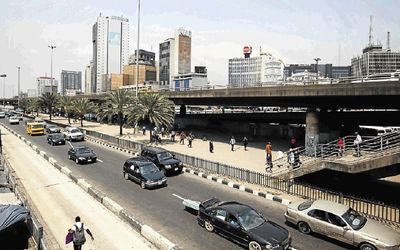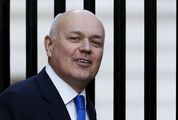Nigerian import curbs hit SA groups
by Zeenat Moorad,
2015-11-23 05:59:00.0
SALES at Mr Price’s Nigerian stores have slowed after the country’s central bank imposed foreign exchange restrictions to stem the flow of dollars out of the country, resulting in delays of merchandise being imported into the country.
Like other retail groups, the company expanded into Nigeria to tap into a burgeoning middle-class, but the country’s economic growth has slowed as a result of lower oil prices, which in turn, is eroding consumer spending.
The bank imposed import restrictions in June to preserve the value of the naira, protect foreign exchange reserves and limit demand for dollars.
"Trading in Nigeria was initially strong, but slowed appreciably in the last two months due to recently imposed restrictions on imported merchandise.
"Although these are expected to be temporary, the company’s interactions with regulators are focused on urgently re-enabling supply," Mr Price said last week, when it reported its first-half earnings. The group has four stores in Nigeria.
Even though it has an increasingly urbanised consumer base, operating in Nigeria has been challenging for South African retailers and manufacturers because of infrastructure bottlenecks, currency volatility‚ corruption and bureaucracy.
Woolworths entered Nigeria through franchises in 2002, pulled out in 2004 due to legislative changes that prohibited clothing imports, and then re-entered in 2011 through a joint venture with 90-year-old Nigerian conglomerate Chellerams.
But the Cape Town-based group, which has traded in the rest of Africa for more than a decade, shut its three stores in Nigeria in 2013, citing high rental costs and duties and complex supply chain processes. The group said some factors had deteriorated to an extent that it had not foreseen.
Congestion at ports in the West African country has also been an ongoing issue for retailers. The global benchmark for container dwell time is about seven days. However, the dwell time in major Nigerian ports is 40 days.
Manie Maritz, group director at The Foschini Group (TFG), said its Markham brand had been well received by the Nigerian market, but the stock delays had a direct effect on sales and the product offering to customers. TFG has one Markham store in the Ikeja Mall, Lagos.
"We continue to work towards a positive resolution in this challenging environment," he said.
Truworth’s chief financial officer David Pfaf, said the chain had been having the same issues at its four stores in Nigeria.
In a bid to prevent naira devaluation and encourage domestic manufacturing, Nigeria’s central bank governor Godwin Emefiele has drawn the ire of foreign investors for restricting the importation of various items including eggs, margarine and palm oil, among others.
In a statement, the central bank said it had become imperative to exclude importers of some goods and services from accessing foreign exchange in order to encourage the domestic production of these items.

Lagos, Nigeria. Picture: EPA/AHMED JALLANZO
SALES at Mr Price’s Nigerian stores have slowed after the country’s central bank imposed foreign exchange restrictions to stem the flow of dollars out of the country, resulting in delays of merchandise being imported into the country.
Like other retail groups, the company expanded into Nigeria to tap into a burgeoning middle-class, but the country’s economic growth has slowed as a result of lower oil prices, which in turn, is eroding consumer spending.
The bank imposed import restrictions in June to preserve the value of the naira, protect foreign exchange reserves and limit demand for dollars.
"Trading in Nigeria was initially strong, but slowed appreciably in the last two months due to recently imposed restrictions on imported merchandise.
"Although these are expected to be temporary, the company’s interactions with regulators are focused on urgently re-enabling supply," Mr Price said last week, when it reported its first-half earnings. The group has four stores in Nigeria.
Even though it has an increasingly urbanised consumer base, operating in Nigeria has been challenging for South African retailers and manufacturers because of infrastructure bottlenecks, currency volatility‚ corruption and bureaucracy.
Woolworths entered Nigeria through franchises in 2002, pulled out in 2004 due to legislative changes that prohibited clothing imports, and then re-entered in 2011 through a joint venture with 90-year-old Nigerian conglomerate Chellerams.
But the Cape Town-based group, which has traded in the rest of Africa for more than a decade, shut its three stores in Nigeria in 2013, citing high rental costs and duties and complex supply chain processes. The group said some factors had deteriorated to an extent that it had not foreseen.
Congestion at ports in the West African country has also been an ongoing issue for retailers. The global benchmark for container dwell time is about seven days. However, the dwell time in major Nigerian ports is 40 days.
Manie Maritz, group director at The Foschini Group (TFG), said its Markham brand had been well received by the Nigerian market, but the stock delays had a direct effect on sales and the product offering to customers. TFG has one Markham store in the Ikeja Mall, Lagos.
"We continue to work towards a positive resolution in this challenging environment," he said.
Truworth’s chief financial officer David Pfaf, said the chain had been having the same issues at its four stores in Nigeria.
In a bid to prevent naira devaluation and encourage domestic manufacturing, Nigeria’s central bank governor Godwin Emefiele has drawn the ire of foreign investors for restricting the importation of various items including eggs, margarine and palm oil, among others.
In a statement, the central bank said it had become imperative to exclude importers of some goods and services from accessing foreign exchange in order to encourage the domestic production of these items.





















Change: 1.19%
Change: 1.36%
Change: 2.19%
Change: 1.49%
Change: -0.77%
Data supplied by Profile Data
Change: -0.19%
Change: 0.69%
Change: 1.19%
Change: 0.00%
Change: 0.44%
Data supplied by Profile Data
Change: 0.62%
Change: 0.61%
Change: 0.23%
Change: 0.52%
Change: 0.12%
Data supplied by Profile Data
Change: -0.21%
Change: -1.22%
Change: -0.69%
Change: -0.51%
Change: 0.07%
Data supplied by Profile Data